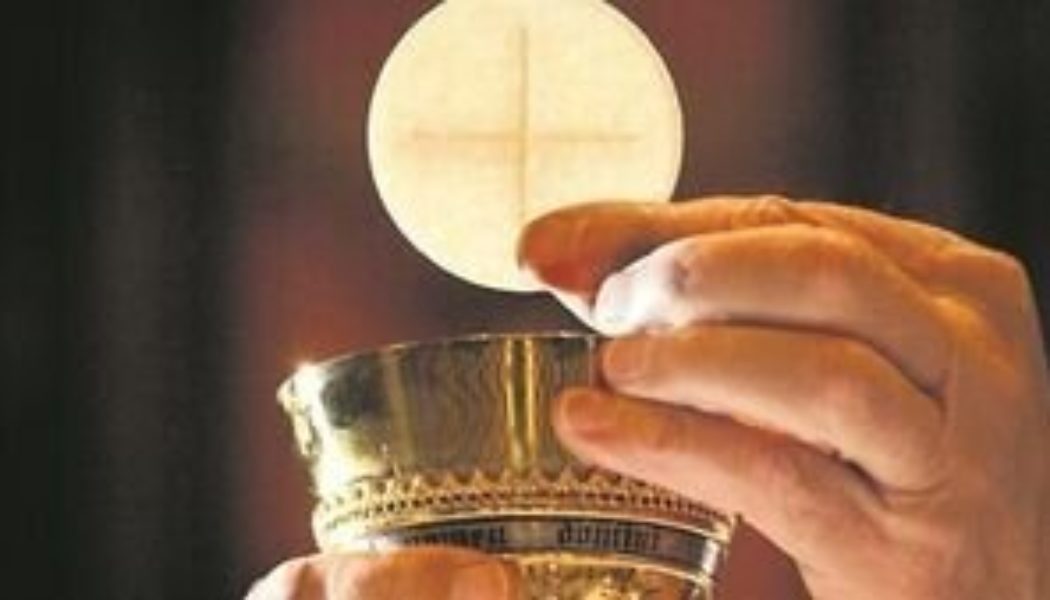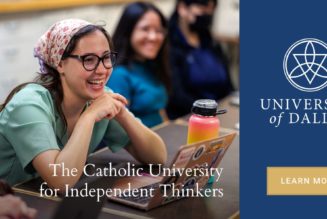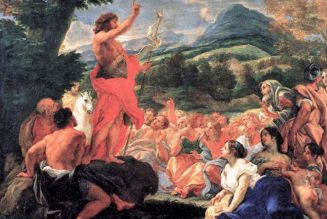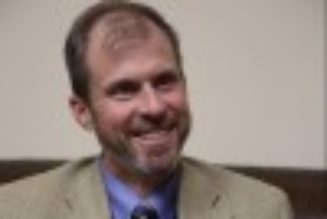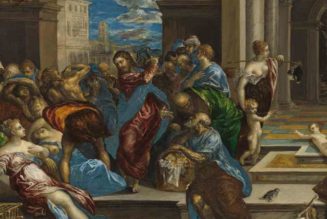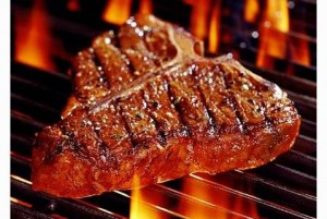
For years now, quite a few mainstream journalists have made it pretty obvious that they think the bishops of the Catholic church have a moral and perhaps even legal obligation to let Catholics do whatever they want to do in public life while continuing to take Holy Communion.
All that matters, according this newsroom version of the evolving spirit of Vatican II, is that these Catholic individuals believe — as a matter of conscience — that they are good to go. Catholics who are on the right side of history even have the right to openly state, in word and deed, that they believe Catholic doctrine is wrong and should be changed. This used to be called Protestantism, but nevermind.
This brings us to yet another Washington Post report about the life and times of a Michigan judge named Sara Smolenski, her same-sex wife Linda and the East Grand Rapids parish in which she is not allowed to take Holy Communion. (For a flashback to earlier coverage, please see this Julia Duin post: “Press doesn’t get why a Catholic priest would withhold Communion from outspoken gay judge.”)
This story does a great job of proving that progressive Catholics have strong views on this issue. The story also offers small bites of material from Catholics stating the church’s doctrinal stance on this matter. If you are looking for any sense of fairness and balance — such as Catholics explaining or defending church doctrine — then you are not going to find it in the Post coverage. Again.
One other key point: This story contains zero references to the role that Confession — the Sacrament of Penance — plays in Catholic teachings on sin, repentance, forgiveness, salvation and, thus, Holy Communion. Hold that thought, because we will return to that point.
The Post headline, this time around, states: “Bishops’ debate over Communion sparked by Biden seeps into holiest sacrament for Catholics.” Here’s the overture:
St. Stephen Catholic Church is the parish and school where Sara Smolenski grew up with her nine siblings, where her parents were married, where she worshiped on Sundays and served as a volunteer distributing Communion. It was also the place where the priest called in late 2019 to tell her she should no longer come up during Mass to receive the holy sacrament.
“He says: ‘I’m going to have to ask you not to take Communion because you’re married to Linda in the state of Michigan. He just kept saying: ‘Respect the church,’” said Smolenski, 63, a longtime District Court judge. …
Soon after the call from Rev. Scott Nolan, leader of the East Grand Rapids, Mich., parish, the coronavirus pandemic shutdown began, and Smolenski has not been to church physically in months. But her situation resurfaced this month when Nolan wrote in the St. Stephen bulletin that the U.S. Conference of Catholic Bishops (USCCB) is now drafting a new document on “Eucharistic coherence” and so he also would be starting a homily series on the sacrament.
What is at stake here? Consider the explanation offered by the Post team for the doctrinal stakes in this debate:
Communion, the central ritual of Catholics’ life that connects them to one another and to Jesus, is back at the center of the Catholic culture wars.
I would really like to know the source for this interesting explanation of the meaning of Holy Communion. There really needs to be some kind of attribution for this crucial material.
As I said, this story does a great job of explaining what progressive Catholics believe about this subject. This was the passage that I thought was especially important, in part because I wondered if readers were only being given part of this person’s commentary on the connection between sin and Communion:
Catherine Maresca, who trains religious educators for work with children, said questions come up with children through the prayer Catholics say as part of receiving Communion: “Lord, I am not worthy.”
The teachers talk, she says, about the roots of the prayer, which lie in a biblical story about a Roman military commander whose servant needs Jesus’ healing, but questions whether he is worthy to have Jesus enter his house.
“The kids say the prayer, and ask: ‘Is it true he’s not worthy?’ We all agree he’s not worthy, but that’s not why Jesus comes — because you’re worthy. Then they ask: ‘Then why do we take Communion?’ And we say: ‘It’s the invitation, almost the command. It’s more about that.’ So that’s where I live with his prayer; it’s immaterial who is worthy, that’s not the right question,” she said.
Now, there is no question — in terms of Catholic theology — that it is “immaterial who is worthy” and that this is not the crucial question here. The question is whether believers are striving to repent of their sins and seek forgiveness.
It really would help to know what Maresca teaches religious educators about the role of Confession in this drama of faith.
Meanwhile, the current (and ongoing) debate centers on whether bishops have any responsibility to clearly state church teachings on what is and what is not sin, according to centuries of church teachings and the words of the Catholic Catechism. Last time time I checked, bishops take vows linked to this duty.
Meanwhile, let’s state the obvious — for journalism reasons. Of course sinners receive Holy Communion. The question, in this case, is what is supposed to happen when believers repeatedly and in some cases publically state that church teachings are wrong and that church leaders have no right to defend church doctrines, in part by asking sinners (which is everyone, of course) to repent, to seek forgiveness and then to sincerely attempt to turn away from their sins.
This brings us to the ongoing silence in press coverage about the role of the Rite of Penance in all of this.
Reporters, of course, have zero right to ask Judge Smolenski about what she does or does not say to a father confessor if and when she goes to Confession.
However, it is clear in this story that her local priest has concerns about her public actions and her clash with church teachings. This is part of the facts of the story. Could journalists ask the judge if she is going to Confession, and receiving Communion, at another parish? This would help readers understand the degree to which Catholic leaders in her community are divided over this issue.
The bottom line: On many levels, these divisions are at the heart of this entire news story at the local, regional, national and global levels. Without addressing these tensions, including the link to the Confession of sins, these stories are simply shallow and incomplete.
Let me end with the opening of my recent post and podcast that addressed this issue, in the context of the actions of President Joe Biden (who, in addition to his consistent defense of abortion, has personally performed same-sex union rites). This is long, but I believe this will help readers see my point:
Let’s say that, at some point in the future, multimedia crews manage to discover where President Joe Biden was attending Mass on a given Sunday.
As the president attempts to leave, journalists shout an obvious question, something like: “Mr. President! The U.S. bishops are almost done with the final draft of their document on abortion, politics and Holy Communion. Are you concerned about this?”
Recently, Biden responded to a similar question by saying: “That’s a private matter and I don’t think that’s going to happen.”
This kind of language, that specific doctrinal issues are “personal” or “private,” has been part of American Catholic code ever since the famous 1984 address at the University of Notre Dame by the late New York Gov. Mario Cuomo.
Here is the twist that I think is relevant, again, in the Judge Smolenski case:
What would happen if [Biden] said this: “That’s between me and my father confessor, so I will have no response at this time.”
This response would have several implications. First of all, it would mean that Biden is saying that he (a) has a father confessor, (b) that he has gone to confession, (c) that he has confessed his sins, (d) that his confessor has assigned him some for of penance and (e) absolved him of his sins. That last part, of course, could be assumed if Biden is receiving Holy Communion.
Oh, and there’s one implication here: That this is happening with a blessing, to one degree or another, from the bishop in authority over Biden’s father confessor.
Thus, in the case of Judge Smolenski, here is the crucial question: Who is the bishop in Grand Rapids?
That would be one Bishop David John Walkowiak, the leader of the Diocese of Grand Rapids. What has he said about this case? Why isn’t he mentioned in the Post report, since the local bishop is the key figure in this matter?
It appears that Bishop Walkowiak did address this issue quite clearly in 2019. Here is that complete statement, which is certainly relevant to the Post story and can be found, in a matter of seconds, with a simple online search:
We appreciate Judge Sara Smolenski’s service to the community. We are grateful for her past generosity. These facts are not at issue in this matter.
As Pope Francis explains in Amoris Laetitia, “The Eucharist demands that we be members of the one body of the Church. Those who approach the Body and Blood of Christ may not wound that same Body by creating scandalous distinctions and divisions among its members.” (186) Lifelong Catholics would surely be aware of this.
Inclusion and acceptance have been a hallmark of Catholic Churches in the Diocese of Grand Rapids throughout the diocese’s history. They remain so. They presume, however, a respect on the part of individuals for the teachings and practice of the wider Catholic community. No community of faith can sustain the public contradiction of its beliefs by its own members. This is especially so on matters as central to Catholic life as marriage, which the Church has always held, and continues to hold, as a sacred covenant between one man and one woman.
Father Scott Nolan, pastor of St. Stephen Parish, has dedicated his priesthood to bringing people closer to Jesus Christ. Part of his duty in pursuing that end is to teach the truth as taught by the Catholic Church, and to help it take root and grow in his parish. Mercy is essential to that process, but so are humility and conversion on the part of anyone seeking to live an authentically Catholic Christian life.
Father Nolan approached Judge Smolenski privately. Subsequent media reports do not change the appropriateness of his action, which the diocese supports.
Has the bishop changed his stance? That’s the big question in this story. Period.
The answer would, of course, involve sin, repentance, forgiveness, salvation, Catholic doctrine and, yes, Holy Communion. Or is politics the ultimate reality for the Post or, perhaps, the only reality?
Join Our Telegram Group : Salvation & Prosperity
